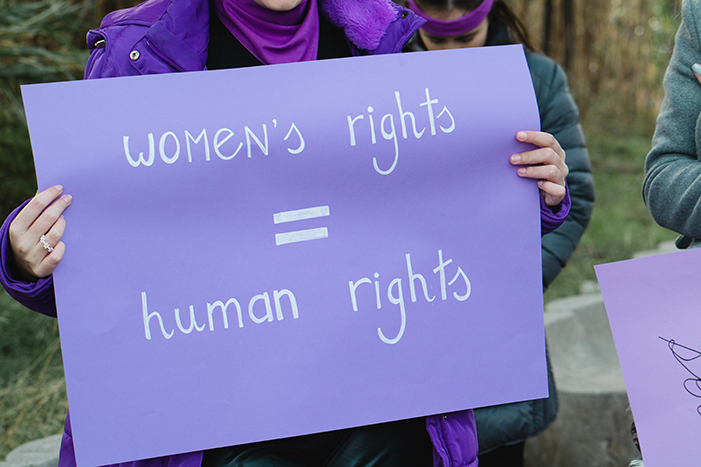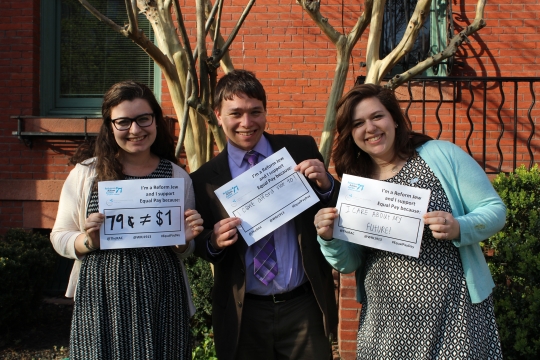
March is Women’s History Month, a celebration that recognizes and celebrates the contributions of women throughout the nation’s history. This year’s Women’s History Month theme is “Celebrating Women Who Tell Our Stories.” At the Religious Action Center of Reform Judaism (RAC), personal storytelling is a key part of our advocacy. Stories are powerful organizing tools to demonstrate values and motivations, challenge stereotypes, humanize issues, build relationships, elicit other stories, and inspire others to take action.
Over the course of the last year, I have heard stories from powerful women who have advocated for change and built movements centered around personal and shared lived experiences. Here are a few stories that have stood out to me:
At the RAC’s own L’Taken Social Justice Seminars, after a weekend of exploring valuable leadership and advocacy skills, students meet with their members of Congress to lobby on social justice issues they are passionate about. In these visits, students share their personal stories in hopes of inspiring the member to support Reform Movement legislative priorities. Students opened up about their fear of going to school due to gun violence and how it motivated them to advocate for an assault weapon ban with March for Our Lives, the impact of their school’s mental health services on their wellbeing during COVID-19 lockdown, their family’s struggles to make ends meet, and their experience navigating natural disasters amidst a growing climate crisis. During such troubling times, the students’ leadership and commitment to fighting for a better world make me optimistic for the future.
Abortion storytelling has become increasingly vital in the wake of the Dobbs v. Jackson Women’s Health decision and in the face of the continued, severe threat to abortion access. Renee Bracey Sherman, the ‘Beyonce of Abortion Storytelling’ and executive director of We Testify, an organization that elevates the voices of people who’ve had abortions, teaches that abortion storytelling is a powerful tool to destigmatize abortion care, shift the narrative of why and who seeks abortion care, and build community and solidarity. Humanizing and dismantling the anti-abortion activists’ stereotypes of abortion and abortion seekers can change hearts and reduce the ongoing threats to abortion access. (If you’d like to hear other abortion stories, I highly recommend you look into Alison Leiby and her one-woman comedy show, ‘Oh God, a Show About Abortion.’ Through a comedic telling of her abortion, Alison normalizes and demystifies abortion care, and unapologetically discusses her decision to remain child-free.) Many of our own Reform Jewish community members have shared and been empowered by sharing the stories of their abortions, as well. Women of Reform Judaism VP of Social Justice Shoshana Dweck shares:
“WRJ's advocacy work encouraged me to share my abortion story out loud, free from euphemisms and whispers. It gave me power to say it again in front of different audiences — I had an abortion — and to tell my unique story. It is easier to tell that story today. I have learned that my story has the power to shape the future.”
In the beginning of Women’s History Month and the close of Jewish Disability Awareness, Acceptance, and Inclusion Month, we mourned the passing of Judith Heumann, z”l. Often called the “mother of the disability rights movement,” Judy began her career in activism fighting to be allowed to work as a teacher in New York City. Her tireless activism was instrumental in the development and implementation of legislation, such as Section 504, the Individuals with Disabilities Education Act, the Americans with Disabilities Act, and the Rehabilitation Act, which have all contributed to making the world a more accessible and inclusive place. Judy’s story is featured in the Oscar-nominated documentary ‘Crip Camp.’ Available on Netflix, the movie tells the story of a summer camp for teens with disabilities and how the campers—including Judy—built a movement that led to key disability rights victories.
In the last year, I also had the honor of meeting Abby Chava Stein, a Jewish educator and rabbi, award-winning author, speaker, and activist. Abby tells her story as an openly transgender woman raised in a Hasidic community, who advocates for transgender and LGBTQ+ rights (among many other issues) and provides support for others leaving the ultra-orthodox community. Hopefully, by truly listening to and uplifting the stories of trans individuals, we can help protect trans rights and counter the concerning anti-trans bills that are popping up across the country.
Finally, I would be remiss not to mention the many pregnant (and formerly pregnant) workers who told their stories of being denied basic workplace accommodations and forced to make the impossible choice between continuing to work while pregnant, possibly leading to health complications, or risking financial security to care for themselves. These stories led to bipartisan passage of the Pregnant Workers Fairness Act this past December. Their bravery and outspoken vulnerability will now impact the lives of millions of pregnant workers for years to come.
Throughout history, courageous people told their stories and helped create monumental change. As Women’s History Month concludes, consider: what is your story and how can you use it to pursue justice?
Related Posts

Reform Jewish Women Vote!


